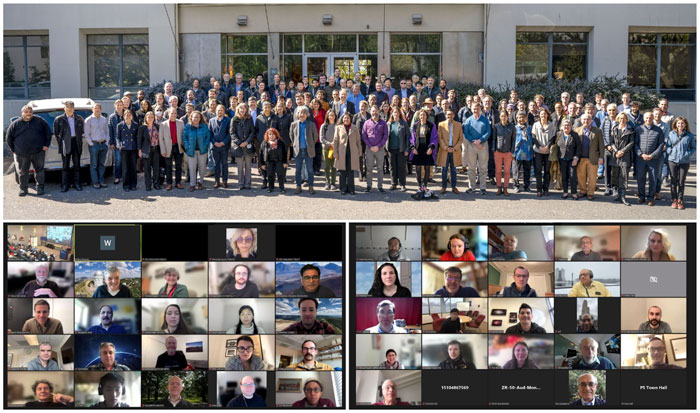Berkeley Lab’s Physics Division hosted the first P5 (Particle Physics Project Prioritization Panel) Town Hall on February 22-24 to launch the pivotal information-gathering phase, during which the Panel learned about the aspirations of the U.S. particle physics community. Building on the 2021 Snowmass Community Planning Exercise, P5 will develop an updated strategic plan for the U.S. high-energy physics program to be “executed over a 10-year timeframe in the context of a 20-year, globally aware strategy for the field.” The Panel’s recommendations will guide the Department of Energy (DOE) Office of Science High Energy Physics Advisory Panel (HEPAP), which advises DOE and National Science Foundation (NSF).
Hitoshi Murayama, a theoretical physicist in Berkeley Lab’s Physics Division and faculty member in the UC Berkeley Physics Department, is the P5 chair, and Cameron Geddes, director of the Accelerator Technology and Applied Physics (ATAP) Division, is a member of the panel. Berkeley Lab director Michael Witherell welcomed participants to the 3-day hybrid event, which was open for remote as well as in-person participation. Many Berkeley Lab researchers were featured speakers – including Matt Pyle, David Schlegel, Ben Nachman, Maurice Garcia-Sciveres, Adrian Lee, Jim Strait, and Physics Division director Nathalie Palanque-Delabrouille.
 In his opening remarks, Murayama (photo left, credit: Thor Swift/Berkeley Lab) described the challenges of defining the boundaries of the field, as well as the importance of addressing the P5 charge to establish priorities for the future. He also described the “changing landscape” of research, the interesting interplay between theory and experiment, as well as the critical importance of creating a more diverse research community through greater participation of women and minority physicists in the field.
In his opening remarks, Murayama (photo left, credit: Thor Swift/Berkeley Lab) described the challenges of defining the boundaries of the field, as well as the importance of addressing the P5 charge to establish priorities for the future. He also described the “changing landscape” of research, the interesting interplay between theory and experiment, as well as the critical importance of creating a more diverse research community through greater participation of women and minority physicists in the field.
Presentations focused mainly on DOE’s Cosmic Frontier research subprogram, as well as other areas of interest to the DOE Office of High Energy Physics (HEP) and NSF Mathematical and Physical Sciences (MPS). Special sessions highlighted research areas such as dark matter and dark energy, and specific programs including DESI and CMB-S4 led by LBNL, and other current and proposed projects. The Panel also heard about new ideas for research projects and focus areas, as well as reports and updates from other committees – including Pathways to Discovery in Astronomy and Astrophysics for the 2020s (Astro 2020), the National Academies’ latest decadal survey; Elementary Particle Physics 2024 (EPP 2024); and the Astroparticle Physics European Consortium (APPEC) – whose findings may influence P5 decision-making.
Speakers representing research organizations worldwide – including Caltech, the University of Chicago, Princeton University, SLAC (Stanford University), UC Berkeley, the University of Washington, the University of Arizona, the University of Utah, UC Davis, the Karlsruhe Institute of Technology, UC San Diego, KEK Japan, and Brookhaven National Laboratory – were invited to present and to provide guidance and context for the Panel. The number of registrants exceeded 500 people, showing strong community interest in the P5 process.
 Open discussion sessions provided opportunities for participants and early career scientists to make brief remarks about their ideas for exciting science projects and new issues facing the community. A substantial effort was made to feature early-career scientists from throughout the Physical Sciences Area. “Training the next generation of researchers is an important part of our mission, and is especially important in a process of decadal scope such as P5,” said Geddes (photo right, credit: Thor Switt/Berkeley Lab). “Today’s early-career researchers will be increasingly important as we build these projects and use their data, and will go on to lead the field into the future,” he added, “so we made sure they had a seat at the table.”
Open discussion sessions provided opportunities for participants and early career scientists to make brief remarks about their ideas for exciting science projects and new issues facing the community. A substantial effort was made to feature early-career scientists from throughout the Physical Sciences Area. “Training the next generation of researchers is an important part of our mission, and is especially important in a process of decadal scope such as P5,” said Geddes (photo right, credit: Thor Switt/Berkeley Lab). “Today’s early-career researchers will be increasingly important as we build these projects and use their data, and will go on to lead the field into the future,” he added, “so we made sure they had a seat at the table.”
Berkeley Lab’s Early Career Scientists in attendance represented a variety of projects across the Physics and ATAP Divisions:
- Joseph DeRose (Physics): Leveraging Cross Correlations to Detect New Physics
- Claire Poppett (Physics): Reflections on DESI construction from early career scientists
- Noah Weaverdyck (Physics): Survey synergies: Direct calibration of weak lensing surveys with spectroscopy
- Lieselotte Obst-Huebl (ATAP): Laser-Plasma Accelerators for Multi-TeV Lepton or Gamma-Gamma Colliders
Participants were also treated to a special preview presentation of “5000 Eyes: Mapping the Universe with DESI,” a new planetarium-format documentary film being released worldwide this spring.
Following this initial Town Hall hosted by Berkeley Lab, similar Town Halls focused on other areas of research in particle physics will be held at Fermilab (Argonne National Laboratory), Brookhaven National Laboratory, and SLAC through 2023. Also, as a result of lessons learned from the last P5, a concurrent panel is being assembled to provide more accurate details about project costs, risks, and scheduling. This committee will be chaired by retired Berkeley Lab senior scientist Jay Marx. The P5 Panel plans to provide a preliminary report on its findings and decision in August, with the final report to be presented in October 2023.

